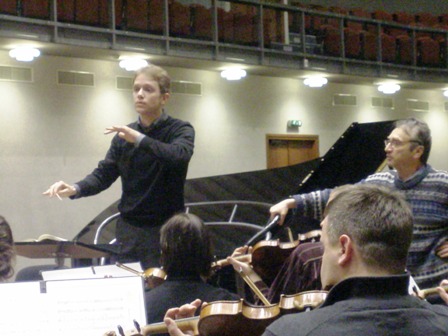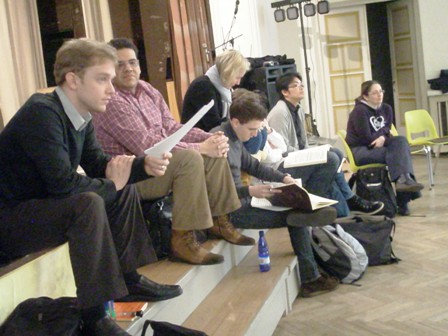
The Art of Conducting: Leonid Grin

Leonid Grin’s conducting master class in Pärnu, Estonia took place Feb. 21-27, 2011 in the city’s sparkling new concert Hall (Kontserdimaja) and area schools. The young conductors led 15-minute sessions with the Pärnu City Orchestra under the benevolent gaze of Grin (and their fellow students).

The course is an extension of the Neeme Järvi Summer Academy, held in Pärnu since
2001. The inaugural class came from six countries. Locking batons (figuratively)
were: Mariya Bikova (Bulgaria), Diego
Garcia (U.S.), Thomas Heuser (U.S.), Antoine Lopez (U.S.), James Lowe (Great Britain), Daisuke Nagamine (Japan), Yura Yang (Korea) and Rachel Young (New Zealand). They were a congenial and
collegial group, participating in the mysteries of conducting by day and
sometimes by night. They shared meals
and breaks at places like the Endla Café and Aleksandri Pub, where they could
enjoy dark bread, herring salad, crepes with honey and a glass of Estonian brew, often in Grin’s company.
Lodgings were at the Villa Artis, a
comfortable and charming bed and breakfast near Lydia Koidula Park. Only the weather was frightful, with frigid temperatures (up to -30 degrees Celsius at night) and a thick layer of slippery ice and snow on the ground.
One evening, everyone crowded into the maestro's room at the Villa Artis for a wide-ranging question-and-answer session. The conversation was lively, even profound, as Grin addressed some of the most fundamental questions about conducting, from rehearsal technique to just what is a conductor? It was a symphony of sorts, from introduction to finale, with appassionato and scherzo-like moments and a recurrent theme: be yourself.
Q: Are there rules for the dress rehearsal of a concert?
A: “If your concert is simply an artistic repeat of your dress rehearsal, it’s a bad concert. In every concert, the orchestra should make a step up, meaning 10 to 15 percent of the level of performance in the dress rehearsal.”
Q: As a person, you have to have self-confidence to do your job. Very easily this becomes arrogance. On the other hand, you can become so self-critical that you can’t lead. Where is the balance?
A: “Arrogance is not welcomed. Self-destruction isn’t either. What is constructive is to follow your passion for music. Go to that world and you will be neither arrogant nor self-destructive. Arrogance comes from making a pose. If you don’t put yourself on a pedestal, if you do it with passion and sincerity, you have to charge the orchestra with your love for the piece you conduct.”
Q: What if you don’t love the piece you’re performing?
A: “As a guest conductor, you’re not always asked to conduct your favorite
pieces. Most often not. You can have this luxury when you are the music
director of an orchestra, when you’ve built
your own season. But it’s still not easy, because when you make a season you
have to be very much the pedagogue. One
thing you think is good for you, but you have to plan what's good for
the strings, what's good for the winds, what's good for ticket sales. It's
combination of all of the above and more. If you take this engagement and it's
not the music which you are dying to conduct, you have to put yourself
through the time given to you to find a way
to love the piece. You have to place yourself in the world of the composition
you have to perform. If you find the real true passion for it inside, then it
will bring you on the right road to work with the orchestra."
Q: How do you adjust passion to technique?
A: "How do you control your technique when you are so passionate about it? It goes
back to your time of preparation for the rehearsal. It goes through analysis of
the piece you are to conduct. You acquire knowledge about the piece. You acquire knowledge about the composer's style, about the
composer's period of life when he was working with this piece. You try to
accumulate all this music theory and musicology into your preparatory way when
you read the score. That kind of analytical mind should get into balance with
your emotional being. Of course, we are so passionate at the beginning of our
life when we come to conduct Tchaikovsky or Brahms or whoever your favorite
composer is!"
Q: Who is a conductor?
A: "As a conductor, you have to be two people in one. You have to be able to be in your skin and to be able to get out of your skin at the same time. There are two vehicles. One who is conducting and one who is looking to see who is conducting. That is a very important thing. When you reach that ability, then you do not get so crazy emotionally. It's like if you were conducting having a mirror in front of you and occasionally looking in the mirror. How do I conduct? It will help you to be more in control.
"We should all understand that so many times we are over-conducting. Being a conductor is to make chamber music. Give them a chance to listen, to adjust. If you sit on their head and beat all the time, you destroy their ability to look around, to see who makes a quartet. I always work with an orchestra giving them the same message verbally. Let's make chamber music. What I do sometimes as a music director, if there is some difficult spot in the string music, I take first violin stand number four, first stand of second violins, third stand of violas, third stand of double basses. Then I change it. Then they make chamber music. It gives them the opportunity to do what they like to do. They hate to play in the orchestra. They all prepared to be a soloist or play in a quartet. It was OK to play in a chamber orchestra, but in a symphony orchestra, very few have the passion in school to go play in a symphony orchestra. So the more chances you give them the feeling that this is chamber music, then it is better. So as a conductor, try to make the orchestra environment a chamber music environment.
“Who
is a conductor? There are so many different angles. A conductor is a composer,
a performer, a psychologist, a teacher, a philosopher and someone who likes a
nice outfit and a good lifestyle. It may sound funny, but it's part of the
whole picture. There's nothing wrong about that. It feeds your good ego. It
doesn't mean that you are an egomaniac, but it helps you to get more
self-confidence. For some people, self-assurance is a very critical issue and
in order to get it, many little things can help. Even a box of candies on your
table can help you to conduct better. Little things which show respect or
give a feeling of importance, of love, help you the conductor to have a
successful performance."
Q: To be honest, isn't it more dangerous to be a violinist or a singer?
A: "Our profession is more insecure than any instrumentalist's because they depend on themselves. We depend on others. We don't have our instrument. We don't play. We are much more insecure. If you connect all the insecurities of all the professions of the orchestra and opera together, then it will be equal to the insecurity of one conductor. It's the most vulnerable profession in music.”
Q: The trust you build between the musicians and yourself is everything and you rely on that?
A: “Not even that. With the best relations you may have, you go to the theater and who is responsible for what's happening onstage? The conductor. Under the best of circumstances, things happen, so speaking about vulnerability, we are the most vulnerable because we never, never know what may happen.”
On instrumentalists vis-à-vis conductors:
“The
violinist plays the violin from age 5, 6 until 15, 16, 17, when he or she
goes onstage to perform. As a conductor, you don't have such a privilege.
Conducting is another form of instrumental playing. But we are not given the
luxury of playing our instrument or practicing at age 5, 7 or 10 as all
other instruments are. You have to learn how to play your instrument which is
called the orchestra. The problem is that you start to learn this profession
too late in your life. You cannot start it early because you have to accumulate
a certain knowledge of all aspects of music. Number two you don't have an orchestra as your instrument to practice like a violinist or a flutist. At the same time,
you're not given time to do this, particularly if you go on the concert stage
beginning when you are 27 or 28. You have a very limited time frame to get into
this world of conductors, and today it is becoming more and more
challenging. Everything has changed these days. When I started, if you hadn't reached the age of 50, you were not yet a conductor. The level of
maturity, understanding of your profession, comes with the wisdom of living
your life. You're given much lesser chances to present yourself than 30 or even 20 years ago. And if you don't use these chances to the full degree, you may not be given another chance."
On
learning to become a conductor:
“Unfortunately, you very seldom come across 'style' in conducting these days because there is no proper schooling of conducting -- where you work with some master for five, six consecutive years to get your own language, your technique, your style of conducting. It's become more sporadic, more eclectic. A little bit from Karajan, a little bit from Bernstein, a little bit of this and this, and where are you? It's very hard to find because there is so much exposure to the media and to the power of the name. These days you have the power of the name. If Carlos Kleiber conducts like this, I have to conduct like this. But you are not Carlos Kleiber. You are not Bernstein or Karajan. You are who you are, and you have to make that from the very beginning, like Play-Doh. You have to form it, you have to shape it and make it your own. It should become your language. Every conductor has he is or her own language of conducting, and if you try to copy, you deprive yourself. You never become an artist.
"The most important thing for you in art is your fragile individuality. Your artistry. It's very fragile and it's very different. Like two flowers. Every flower is different from another one. If you don't nourish yourself, you don't nourish your personality. You're not an artist. You are a craftsman. Don't be a copyist. Search for yourself. I don't say that you can't get some idea from some colleagues that are more experienced. You can ask, you can share it, but how does it fit into your physicality, your personality? It's your language, your gestures, your manual technique. It's a language of communication that should match your overall image, your hands coming out of your body, not Bernstein's. What fits one not necessarily fits another one. These people found their level of comfort and expressing themselves eloquently. So should you. Search for your language and see how it fits you."